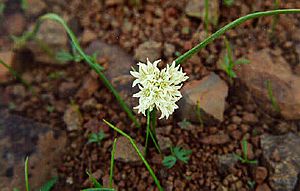Cuddy Mountain onion facts for kids
Quick facts for kids Cuddy Mountain onion |
|
|---|---|
 |
|
| Allium fibrillum | |
| Conservation status | |
| Scientific classification | |
| Synonyms | |
|
The Blue Mountain onion (Allium fibrillum) is a type of wild onion found in North America. It's also sometimes called the Cuddy Mountain onion. This plant grows naturally in the northwestern United States. You can find it in places like eastern Washington, Oregon, Idaho, and Montana.
Contents
What Does the Blue Mountain Onion Look Like?
This special onion grows from a bulb, which is like a small, round underground storage part. Sometimes, you'll find a few bulbs growing together. Each bulb is usually about 1.2 centimeters long and 1 centimeter wide.
The plant has two flat, long leaves that can grow up to 24 centimeters (about 9.5 inches) in length. By the time the plant starts to flower, the tips of these leaves often begin to dry out.
Flowers and Seeds
The Blue Mountain onion sends up a flowering stalk that can reach about 15 centimeters (nearly 6 inches) tall. At the top of this stalk, you'll see a cluster of 10 to 20 bell-shaped flowers. This cluster is called an umbel. The flowers are usually white, but they often have green or pink stripes down the middle of their petals.
After the flowers bloom, the plant produces a fruit that looks like a small capsule. This plant can make new plants in two ways: it can grow from seeds, or it can sprout new plants directly from its bulbs.
Where Does the Blue Mountain Onion Grow?
The Blue Mountain onion likes to live in specific places. It often grows on top of mountains or in areas called scablands. Scablands are rocky, flat areas that were shaped by ancient floods.
You can find this onion in different types of natural environments. These include areas with sagebrush, which are dry lands with many shrubs. It also grows in shrubsteppe habitats, which are grasslands with scattered shrubs. Of course, it also thrives in open grasslands.
See also
 In Spanish: Allium fibrillum para niños
In Spanish: Allium fibrillum para niños


